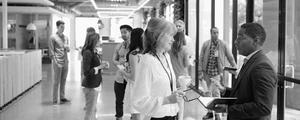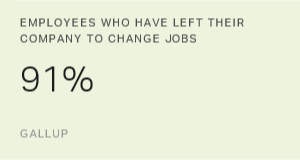Story Highlights
- Strengths program essential to the company's talent strategy
- Teams that received strengths training showed success quickly
- Managers increasingly use strengths to run teams
Cardinal Health has a history of seizing opportunities. The company launched in 1971 as a food distributor in Columbus, Ohio. It added pharmaceutical distribution in 1979 and went public four years later. The company kept expanding its offerings and its footprint, selling its food distribution arm in 1987.
Cardinal Health is now a Fortune 22, $91 billion, 34,000 employee company that delivers medical supplies -- including drugs, gowns, medical devices and just about every other tangible item healthcare providers need -- to pharmacies, hospitals, labs and physician offices on four continents.
The company got so big so fast because it focuses on providing patients and healthcare providers with cost-effective services while ensuring quality and efficiency -- and the need for quality and efficiency has increased since the Affordable Care Act went into effect. To anticipate and respond to new opportunities, Cardinal Health knows it must be able to move and adapt quickly.
"When you ask CEOs what keeps them up awake at night, they say things like keeping up with the speed of change, globalization, data security -- but especially the ability to remain relevant," says Lisa George, vice president of global talent management at Cardinal Health. "The ability to remain relevant is directly connected to leadership, talent and adaptability."
"Developing and leveraging employees' strengths," George adds, "helps with all of that." Building an effective strengths program has become an essential part of Cardinal Health's talent strategy to compete in a fast-changing and complex marketplace.
Getting the Gears to Mesh
Cardinal Health understands that people who use their strengths every day are six times more likely to be engaged in their jobs and more than three times more likely to report having an excellent quality of life than those who don't, as Gallup research shows. People who know their strengths are also 8% more productive -- and teams that focus on strengths every day have 12.5% higher productivity. To capitalize on benefits like these, Cardinal Health introduced the Clifton StrengthsFinder (CSF) -- an online assessment that identifies users' top strengths -- in 2004.
The company trained a few strengths coaches to help employees use what they learned, but integrating strengths day-to-day in a holistic way was left up to individual managers and leaders. Some grabbed the program and ran with it, but many didn't. During the first seven years the CSF was available, fewer than 1,000 employees took it.
"We all had the opportunity to take Gallup's Clifton StrengthsFinder assessment. Whether we were all aware that we could is a different story," says Barbara Hess, director of organizational development at Cardinal Health. "There were pockets that had integrated strengths and pockets that hadn't put much thought into it."
That struck some at Cardinal Health as unrealized potential. "The magnitude of what we do is growing exponentially," says George. "We have new offerings and deeper product solutions. We're emerging into direct patient care, and we're seeing massive domestic and international growth. The sheer scale of what we're doing is complex, involves every employee group and requires collaboration and teamwork. And strengths is an essential element of this."
A good bit of Cardinal Health's domestic and international growth happened through acquisition. That approach will get medical supplies to a lot of people, but it can cause problems for a company. Blending departments, sorting personnel and erasing redundancies can take an emotional toll on employees and has a practical effect on the way they do their jobs. Cardinal Health uses a variety of strategies to help the gears mesh -- talent management, inclusion initiatives, manager effectiveness training and a strengths development program.
A typical strengths development approach includes many steps. Employees take the CSF, learn their talent themes and are coached in how to use those talents on the job. Managers learn how to coordinate the various talents on their team to make it more effective. Leaders are taught how to use employee strengths to improve productivity and profitability. As a result, the company as a whole begins to pull together, applying employees' greater knowledge of their abilities and how to channel them.
Hess and many others wanted those advantages for Cardinal Health. She knew that employees had to see it for themselves; just telling people that adopting strengths would lead to higher engagement, greater productivity, and better communication and teamwork wouldn't work. To make that happen, Hess needed to find a leader willing to stick his neck out.
Finding a Champion
"To create desire, you go where the energy is," Hess says, so she started looking for a senior leader to serve as a strengths champion. She began by studying the different divisions, identifying areas where a focus on strengths could return quick, big results. Then she studied leaders, noting their talent themes, looking for one who could immediately grasp the potential of strengths. She found what she needed in Jon Giacomin, CEO of the pharmaceutical segment.
"Jon is a brilliant guy, wicked smart and really influential. He hates losing, he genuinely cares about people, and he wasn't getting the traction he wanted in manager effectiveness. It really bothered him," Hess says. "So once we gave him the context and the information -- helped him become aware of strengths as a solution to a problem -- he decided to try it."
"All of a sudden, things started changing," Hess says. "Manager effectiveness began to improve. There's an assumption that warehouse and entry-level employees are harder to engage, but Jon and his leaders proved that wrong."
Other leaders started to notice Giacomin's results and how he got them. A few developed an interest in strengths, and the strengths program was ready for them.
"We designated processes that the business and the business leaders valued," says George. "When you deliver what people want and need, you don't have to push. The practical gets pulled. We built collaboratively, we told stories about the StrengthsFinder journey and we showed value. That was enough to get people interested and to make them want to come along on the journey."
Teams that received strengths training showed success quickly. Teams with the greatest focus on strengths reported results like these: "[Strengths] helps team dynamics and collaboration," "[strengths] helps people and teams work more effectively," teams have "better understanding and communication tactics to help leaders understand how to create better productivity" and teams are "more committed."
"After implementing [Gallup's strengths development program], manager effectiveness improved and people started working together better," Giacomin says. "The StrengthsFinder assessment gave us the opportunity to understand our strengths as individuals and as teams. We learned to appreciate and harness our individual talents and tendencies, identify where we have gaps in team strengths and understand how that impacts team dynamics."
The Road Ahead
Since the program was introduced, the number of completed CSF assessments has more than quadrupled. More managers are using strengths to run teams, and people all over the company are using what they know about their talents every day. But that's just the groundwork, the implementation phase. Now it's time to make strengths a part of Cardinal Health's operating system.
"All of our leadership, business and management strategies include at least an element of strengths, and it's having a cumulative impact on our capabilities," says George. "And as we change, we need to innovate. We need to be able to see around corners, anticipate what's coming next and be ready when it happens -- we have to be able to move and adapt fast. That's why scaling up our capabilities is so significant."
"Scaling up" includes developing strengths-based performance management systems, international strengths benchmarking and workforce planning and talent review processes; creating alignment with Cardinal Health's vice president and director level development programs; and using strengths to onboard new employees. And that's just the start.
"What we've been doing works really well, but there's definitely an appetite for next-generation strengths," says Stephanie Saunders, senior consultant of organization development at Cardinal Health. "Leaders are hungry for more; now they want to know [other ways] they can apply strengths."
According to Saunders, those requests are getting more intense. So Gallup has given refresher train-the-trainer courses to Cardinal Health's original strengths coaches and created a strengths webinar series for them. Saunders and Hess also used Gallup's Theme Thursday live webcasts in which each of the 34 themes is discussed in-depth one Thursday at a time for coaches, ambassadors and employees. Cardinal Health is training new strengths coaches and ambassadors because their current 15 coaches and 43 ambassadors won't be enough to meet demand for much longer, Saunders believes.
As strengths become increasingly more relevant at Cardinal Health, the company will find more ways that it can be relevant. "[Strengths] builds connections on a lot of levels," says George. "It's expanding our awareness of the relationships between people and their managers -- and between managers and more senior leadership -- and between Cardinal Health and our customers. Strengths shows people where they're most successful and creates connections between that and our mission. Now that we have that line of sight, it would be hard to go back to a time without it."


